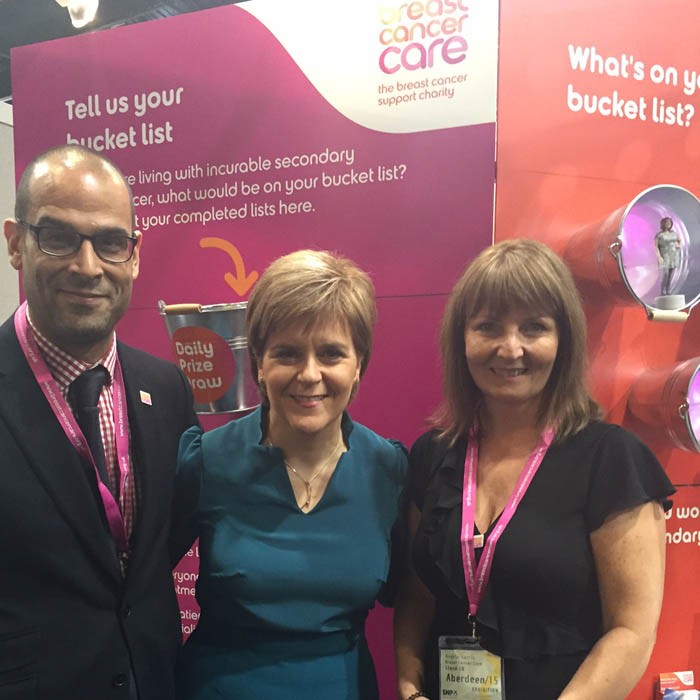Since the launch of our ‘bucket list’ campaign in September, we’ve met with party leaders, our campaign was raised in Parliament and 600 of you sent messages to Health Ministers.
Since we launched our ‘bucket list’ campaign for secondary breast cancer in September, we've had quite an impact. After attending three party conferences, meeting with four party leaders, receiving support from lots of MPs, having a parliamentary debate and being included in Prime Minister’s Questions, it's safe to say we've pushed secondary breast cancer well and truly up the political agenda – and so many of you have played such an important part in this.
The bucket list campaign aimed to raise awareness of the disease and where care needs to be improved by asking people to share their bucket lists with us. Breast Cancer Care has its own bucket list for secondary breast cancer, with five things that need to happen to improve care.
-
No one living in unnecessary pain.
-
Everyone having access to the treatments they need.
-
All patients having a clinical nurse specialist as part of their care.
-
Hospitals being able to plan services to meet patients’ needs.
-
Everyone’s care being co-ordinated and joined up.
For the party conferences, we turned our bucket list into an interactive exhibition stand, featuring the stories of five women living with secondary breast cancer. Some of these women came with the stand to the Labour, Conservative and SNP conferences where we spoke to hundreds of people about our campaign. We made quite a splash! Two of our volunteers, Emma and Frances, were invited to a private meeting with leader of the Labour Party, Jeremy Corbyn, while Dee got to speak to Prime Minister, David Cameron about what it is like living with secondary breast cancer.

Frances and Emma meet Jeremy Corbyn

Our Head of Policy and Campaigns, Danni Manzi meets Prime Minister, David Cameron at our Bucket List stand

Nic White and Angela Harris from our Scotland office meet First Minister, Nicola Sturgeon
Following the Conservative Conference, it was Secondary Breast Cancer Awareness Day on Tuesday 13 October. We took our stand and volunteers to parliament, where around 90 MPs came to show their support for our campaign. And thanks to you, Health Ministers in England, Wales and Scotland received over 600 messages, calling on them to improve care for secondary breast cancer.

Our Director of Services and Engagement, David Crosby, campaigner Sue and Craig Tracey MP
The day after Secondary Breast Cancer Awareness Day, we had a great result. At the weekly Prime Minister’s Questions, Jeremy Corbyn, using the same style he has adopted of asking questions from the general public, used one of his allotted questions to raise his meeting with Emma and Frances. He pressed the Prime Minister on the importance of data collection on secondary breast cancer – a point that Mr Cameron agreed was an important issue.
Finally, last week, there was an hour-long debate in parliament on secondary breast cancer. Craig Tracey, co-chair of the All Party Parliamentary Group on Breast Cancer, led the debate, raising our bucket list items and calling on the government to do more to support people living with the disease. MPs also mentioned the efforts of our campaigners during the debate, congratulating Jade, Sue and Dee for all of their hard work.
In response, Jane Ellison, Public Health Minister, said the government 'want[s] to do a lot better in tackling cancer, and our aim is to lead the world'. She highlighted improvements to date, including the recent cancer strategy including measures for secondary breast cancer. However, she said: 'But we do want to go further.'
Watch the debate in full or read the transcript
While the past few weeks have been a big success in terms of raising awareness and putting pressure on the government, our campaign continues. We still need to see big improvements in the care and support that people living with secondary breast cancer receive. Pushing this up the agenda is one step toward achieving that goal. We can only do this together and that’s why we are so grateful for everyone who has taken part in the campaign. Together, we can make sure everyone with secondary breast cancer gets the care they need.
Update: On Wednesday 28 October, the Department of Health issued a statement in response to our Bucket List campaign. The government stated that it recognised the importance of data collection on secondary breast cancer and that it was not happening consistently. The statement also references the new cancer strategy and the improvements to access to specialist nursing and palliative care that are expected to result from this.
To keep up to date with the campaign and to find out more about opportunities to get involved, sign up to our Campaigns Network.